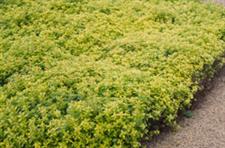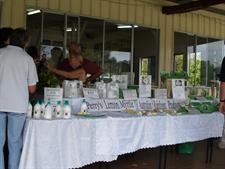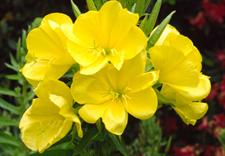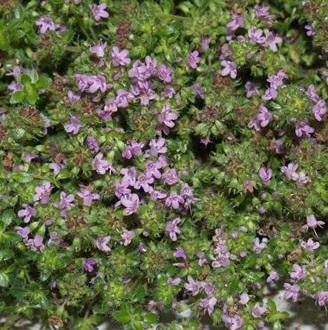
Fantastic Opportunities
There are more opportunities than you might imagine to work, and earn a living from herbs.
- Plant nurseries propagate and grow hundreds of different herbs. Some supply garden centres with their plants; others sell direct to the public, off site, at markets, or by mail order
- Large scale herb farms might grow tens of acres of just the one type of herb, harvesting with machines and selling to processing plants. Toothpaste and confectionary manufacturers source their mint from large herb farms. Cosmetic companies buy their oils from herb farms
- Small scale herb farms and nurseries might be only one to several acres in size; and might diversify their activities. They might grow some herbs in a field to harvest, dry or extract oils from, or processi in some other way. They may also propagate and grow herbs in pots to sell. Added to this, they may maintain a display garden with labelled plants; and operate a small cafe and shop. This type of enterprise can become a profitable tourist attraction; as well as a supplier of both wholesale and retail produce to locals. It must be conceived and managed well though.
- Some commercial herb farms will specialize; perhaps growing large quantities of fresh culinary herbs to supply restaurants and fruit/vegetable shops; or maybe producing oils and extracts for the perfume or medical industries.
These are just a few of many types of enterprises that may be found in the herb industry.
COURSE STRUCTURE AND CONTENT
Course Duration: 900 hours.
Start Date: Start at any time - study at a pace that suits you and with full tutor support for the duration of your studies.
Course Composition: The Advanced Certificate in Applied Management (Herbs) comprises:
4 Core Units (Office Practices, Business Operations, Management, Marketing Foundations).
2 Stream Units (Herb Culture, Medicinal Herbs).
1 Elective Unit (students select from: Aromatherapy, Lavender, Scented Plants).
A 200-hour Workplace Project.
THE CORE UNITS
Office Practices
 Develops basic office skills covering use of equipment, communication systems (telephone, fax, etc.) and office procedures such as filing, security, workplace organisations, etc.
Develops basic office skills covering use of equipment, communication systems (telephone, fax, etc.) and office procedures such as filing, security, workplace organisations, etc.
Business Operations
Develops knowledge of basic business operations and procedures (e.g. types of businesses, financial management, business analysis, staffing, productivity, etc.) and the skills to develop a 12 month business plan.
Management
Develops knowledge of management structures, terminology, supervision, recruitment and workplace health and safety.
Marketing
Develops a broad understanding of marketing and specific skills in writing advertisements, undertaking market research, developing an appropriate marketing plan and selling.
THE STREAM UNITS
Herb Culture
Herb Culture is divided into twelve units. Each unit comprises one or more lessons, as follows:
Unit 1 Introduction To Herb Culture
- Lesson I. Introduction to herbs, definitions, uses. Classification of herbs; use of a
 botanical key.
botanical key.
- Lesson II. Cultural Techniques...planting, soils, drainage, feeding, mulching, composting, pruning.
- Lesson III. Propagation Techniques...propagation mixes, growing structures, cuttings, seed, separation and division, layering.
- Lesson IV. Identification of plant health problems: pest and disease, frost, heat, water stress, etc.
Unit 2 Using Herbs
- Lesson I. Processing and Use of Herbs: Medicinal, culinary, perfumes, dyes, oils, distillation processes, etc.
- Lesson II. Harvesting and Storage: Air drying, oven drying, microwave drying, freezing, fresh storage, when and how to harvest.
Unit 3 The Mints (Lamiaceae)
- Lesson I. Mentha species: Peppermint, spearmint, applemint, wintermint, pennyroyal,
.JPG) corsican, ginger mint etc.
corsican, ginger mint etc.
- Lesson II. Lavender (Lavendula varieties) and thyme (Thymus).
- Lesson III. Assorted Lamiaceae varieties: Lemon Balm, Hyssop, Rosemary, Bee Balm (Monarda), Basil, Savory, Marjoram, Sage.
Unit 4 The Daisies (Asteraceae)
- Lesson I. Artemisia species...Southernwood, Wormwood, Tarragon, Mugwort.
- Lesson II. Miscellaneous Asteraceae: Chamomile, Tansy, Safflower, Costmary, Yarrow, Calendula, Dandelion etc.
Unit 5 The Parsley Family (Apiaceae)
- Lesson I. Parsley, Coriander, Dill, Caraway, Angelica, Cumin, Fennel, Lovage, Sweet Cicely etc.
Unit 6 The Onion Group
- Lesson I. Chives, Leek, Garlic chives, Tree onion, Welsh onion, etc.
- Lesson II. Garlic
Unit 7 Other Herbs
- Lesson I. Rosaceae (Rose, Burnet, Strawberry, blackberry, etc.)
- Lesson II. Miscellaneous: Lemon grass, Lemon verbena, Bay, Sorrel, Dock, Juniper,
 Horseradish, Evening Primrose, etc.
Horseradish, Evening Primrose, etc.
- Lesson III. Scented Geraniums, Australian Natives, Eucalyptus and Others
Unit 8 Pests and Diseases
- Lesson I. Companion Planting
- Lesson II. Natural Pest Control: Herb sprays, biological control, etc.
Unit 9 Landscaping
- Lesson I. Landscape Design Principles and Practices: How to draw a landscape plan
- Lesson II. Home Gardening With Herbs: Cottage gardens, hedges and borders, tubs, baskets, kitchen gardens, herb lawns, herb indoor plants.
 Lesson III. Public Landscaping: Historic herb grdens (Knot gardens etc), herbs for low maintenance and colour in parks..etc.
Lesson III. Public Landscaping: Historic herb grdens (Knot gardens etc), herbs for low maintenance and colour in parks..etc.
Unit 10 Herb Farming 1
- Lesson I. Establishing and Operating a Herb Nursery: Open ground vs container growing, nursery layout, potting soils, pots and labels, marketing, etc.
Unit 11 Herb Farming 11
- Lesson I. Establishing and Operating a Herb Farm: Soil Preparation and management (plastic mulch, organic mulches, cultivation), row cropping.
Unit 12 Herb Farming 111
- Lesson 1. Evaluating Herb enterprises, assessing market demand. Deciding how to proceed.
Medicinal Herbs
There are eight lessons in this unit as follows:
- Introduction to Medicinal Herbs
- Culture of Medicinal Herbs
- History
- Main Medicinal Herbs
- Herbal Remedies
- Preparing Herbal remedies
- Poisonous Plants
- Developing a Production Plan
THE ELECTIVE UNITS
Students are to select one of the following units:
Aromatherapy
Lavender
or
Scented Plants
THE WORKPLACE PROJECT
To complete this qualification, you are also required to complete a workplace project lasting 200 hours.
There are 4 options available to you to satisfy this requirement. The options will be different dependent upon whether or not you currently work within the industry. The project can be work experience, voluntary experience, a project you carry out, other training you have already undertaken and there are other options. Don’t worry if you are not sure how to proceed at this stage, as your tutor will be there to discuss how to proceed and help you every step of the way.
A SYSTEM YOU NEED TO LEARN
Learning to know, grow and use herbs, starts with learning about the similarities and differences that separate one herb from another. When you understand the characteristics that differentiate herbs, you have a foundation for not only identifying them, but also knowing how to manage them.
The classification of herbs is a very logical thing. Most herbs actually fall within one of a small number of plant families. You will learn about all of these families in this course; as well as many of the herb cultivars in each.
The Lamiacaeae family is very important example. It covers a vast number of popular and lesser known herbs. Herbs that we use in every day cooking such as Thyme, Basil, Sage and Rosemary as well as less commonly grown herbs that have medicinal value such as Black horehound and Calamint.
Important members of the Lamiaceae family, including Thyme (Thymus sp.), Sage (Salvia sp.), Balm (Melissa sp.), and Basil (Ocimum sp.). This family used to be called the Labitae family. Both names are in common use though Lamiaceae is preferred.
Consider Thymus

Thyme is used world-wide as a condiment, for its essential oil (Thymol) and as an ornamental plant. The Genus Thymus originating from Europe and North Africa consists of approximately 350 species of perennial plants ranging from prostrate, carpeting type of growth through to small woody sub shrubs.
Thymol is the essential oil distilled from the leaves of thyme plants and is considered to be one of the world’s most important essential oils. It is an anti-oxidant, has anti-bacterial properties, is used as a food preservative and is also said to have anti-aging qualities. The diverse application of the oil makes it a very attractive commercial proposition, with market demand on the increase. Most thyme oil is produced in Europe and with a lesser quantity coming from America and Canada. Plants are constantly researched and selective breeding has ensured hardy vigorous plants that are adaptable in cold climates.
Thyme is also an attractive low care garden plant that can be used as border plants and ground covers as well as in the herb garden for use in the kitchen.
Thyme thrives in full sun and any well-drained soil, although coarse gritty soils are most preferred. The only way to kill thyme is by growing it in wet, waterlogged conditions as it develops root rot and is prone to fungal disease in these conditions. Thyme produces short thick growth without the application of too much fertiliser; excessive fertiliser tends to produce lanky, weak plants. Mulch and a small quantity of blood and bone are recommended yearly as well as water during a very dry spell. Replace thyme plants that are grown for culinary purposes (i.e. their leaves), every few years as they tend to become woody.
SUCCESS DEPENDS ON MORE THAN JUST HORTICULTURAL KNOWLEDGE
Good managers often fail in the herb industry because they simply don't know and understand the products they are dealing with. Similarly, good herb growers or manufacturers can just as easily fail, because they simply don't know how to manage their products in a profitable way.
If you produce good products and can't sell them; you don't survive in a job or business.
If you sell bad products because you can't determine what you should be selling; you can also fail.
This is a course that seeks to ensure you don't make either of these mistakes in your career, or business.
HOW THE COURSE WORKS
You can start the course at any time.
It is studied by distance learning, so you can study in the comfort of your own home. But this doesn't mean you are all alone in your studies. Our highly qualified and friendly tutors are there to help you every step of the way. If you have any questions at all, they are always happy to help.
Each lesson includes set tasks, and is completed with an assignment which the student submits to their course tutor. The tutor will mark the assignment and return this to the student with comments and suggestions for further reading.
HOW THE ADVANCED CERTIFICATE IS ASSESSED
The Advanced Certificate In Applied Management (Herbs) requires approximately 700 hours of study. It is made up of seven 100-hour units and a workplace project lasting 200 hours.
To pass the course –
- Pass all assignments on the seven 100-hour modules. There will be an assignment at the end of each lesson to submit to your tutor for marking and feedback.
- Pass seven examinations – one on each module. These are usually taken at the end of the module and can be arranged at a time and location to suit you.
- Complete a Workplace Project. The project should last around 200 hours. There are four options available to you to satisfy this requirement. Don’t worry if you are not sure at this stage, your tutor will be there to help you every step of the way. This includes evidence of work experience or other studies or workshops, a research project or completion of Workshop I.
This qualification is accredited by IARC (International Accreditation and Recognition Council).
STUDYING WITH ACS
At ACS we provide you with more than just a set of course notes.
Your 'learning package' includes:
- Course notes.
- Self-assessment quizzes.
- Assignment feedback.
- You can interact one on one with a professional tutor with decades of experience - just email, phone or log on to chat to connect with them.
- Depending upon your course, your studies may involve independent research, interviews, practical exercises, assessments, Problem Based Learning projects, and more.
OUR STUDENTS SAY
“I wanted to study herbs but I could not find a course at my closest TAFE, and travelling to Adelaide each day was not practical. ACS offered the best option - study at home, at my own pace and still tutor contact when I needed it. I was undecided in the facet of herbs that I wanted to specialise in - that was until I completed an assignment to produce three herbal products. My tutor tested my products and encouraged me to set up a small business making and distributing a range of natural herbal cosmetic and household products. His guidance has helped me establish an interesting and profitable business from my studies.”
Catherine – Advanced Certificate In Applied Management (Herbs)
WHAT NEXT?
Register to Study today - Go to “It’s Easy to Enrol” box at the top of the page and you can enrol now.
or
Contact us - use our FREE COURSE COUNSELLING SERVICE to contact a tutor - they will be more than happy to answer any questions you may have.
or
Email us at info@acsedu.co.uk
or Phone us at (UK) 01384 442752.